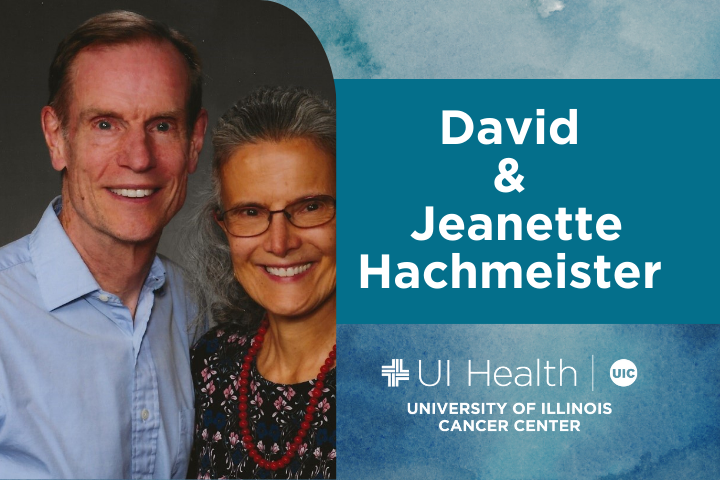
When David and Jeanette Hachmeister celebrate their 50th wedding anniversary this year, they will do so with tremendous gratitude given that on their 26th anniversary in 2000, David was diagnosed with a particularly aggressive form of prostate cancer.
David’s father had died of prostate cancer at the age of 62, so given the family history, his doctor James Giblin, MD, did biopsies, and upon receiving the results, changed his vacation plans so that David could have necessary surgery sooner.
David recalls his treatment journey, which after surgery, went on to include hormone therapy, chemotherapy and radiation, yet still his prostate specific antigen (PSA) levels did not zero out. By 2003, despite the best treatment by Nicholas Vogelzang, MD, at the University of Chicago, David’s treatment options had run out and a consultation at the Mayo Clinic had concluded that David had 3 to 5 years to live. It was at this point that David’s physician recommended David enroll onto a Phase III clinical trial and referred him to David J. Peace, MD, a leading immunotherapy researcher and clinician at UIC in 2003.
Prior to all of this, David and Jeanette had no knowledge of clinical trials. David was a healthy-looking 48-year-old when they were given a terminal diagnosis. With Dr. Peace, David enrolled onto Dr. Peace’s clinical trial and underwent a process called leukapheresis. The treatment was successful and David’s PSA levels have been at zero ever since.
“I am deeply appreciative of the University of Illinois Chicago. It made lifesaving measures possible that were not available elsewhere.” David Hachmeister
David recalls the first two times it was quite traumatizing waiting for his PSA level test results to come back. At the time, David and Jeanette had one child in college and the other child heading to college. Jeanette had her own career so worried how she would take care of David, take over his publishing company business, still have her own career, and be a mom. She recalls it being a horrible moment when she didn’t know which step to take. However, Jeanette recalls that Dr. Peace and his assistant were wonderful and helped allay their fears.
David notes, “I’m by nature a positive person and always try to find solutions to problems. I love doing that so I kept pressing to find something that would work better. I think that some of the reasons I’m here today are because of the personal way I am and faith is a big part of it too.”
When asked to reflect on their gratitude, David mused, “Just the fact that I am able to write something 20-odd years after a terminal prostate cancer diagnosis from the Mayo Clinic is a gift beyond description. My wife was not a widow at 50. We will celebrate our 50th wedding anniversary this year. I got to see my children grow into wonderful, kind and responsible adults. I started businesses to care for seniors and veterans in their homes. We started a thank calendar, sometimes including seemingly ordinary moments. It is those ordinary items that are so precious and so easy to overlook. I am thankful for every meal, every sunrise, and the research that made them possible to enjoy.”
Both David and Jeanette recall learning the concept of giving back from their parents. Continuing this tradition, David and Jeanette have made consistent annual philanthropic contributions to the University of Illinois Cancer Center in support of cancer research for more than 20 years and have made provisions to include the Cancer Center in their estate plans.
In thinking about this legacy, David noted, “If I have a legacy, I’d like it to just be that I was a decent human being and found happiness and fulfillment through providing help to other people.”
Jeanette is a huge proponent of the promise of immunotherapy because of David’s experience. She tells friends experiencing cancer to find a Phase III trial in their area.
To learn more about clinical trials, please visit our website here
To make a donation in support of cancer research, please visit our website here
